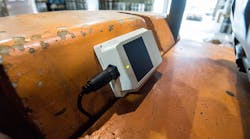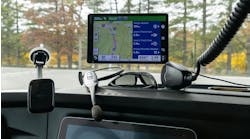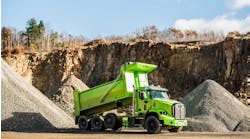The bigger they are, the harder fleets are to manage. That's only logical as more trucks mean more routes, drivers, loads, transactions, problems, documents, and work. At some point, new ways to slice the data and optimize fleet operations will be useful only if you can take some action and get positive results without the business itself having to put in additional labor to make that happen.
And that's a major focus of companies that use artificial intelligence, or AI, with fleet and asset tracking and management systems. "How can we remove manual steps from the process? How can we reduce that manual workload for fleets and automate things as much as possible?" noted Rushil Goel, vice president of product at Samsara, one such company.
Samsara has been investing heavily in AI as part of its connected fleet/business operations platform. "AI is a big part of our strategy around how we can help the information be really actionable and customers be proactive with the data they're getting from their fleet," Goel told Fleet Owner, "whether it's through cameras, vehicle gateways, or fleet or asset tracking."
Some sort of advanced processing such as AI can enable becomes more and more necessary as you add more trucks to a fleet, he contended. As a baseline, Samsara has found that each of a fleet's trucks typically will see around one harsh driving event or "event of interest" per day.
"Then if you've got tens of thousands of vehicles, that's just hours upon hours of footage you've have to review if you were doing things manually," Goel pointed out. "We've seen customers getting so overwhelmed with the data they're presented with, especially at large organizations, and this is where a lot of the new advances we're seeing in AI allow us to streamline and simplify things."
If the question is how to make fleet customers' data actionable, ironically, a good answer is to remove or reduce the fleet's need to take any manual action on it. "AI can be that 'smart assistant' that's helping you along the way," Goel noted. "It's helping you understand which of your drivers need attention most, which incidents need attention most, which vehicles are most likely to have breakdowns and issues."
"AI also becomes the tool that assists to make the jobs of those in the field easier," he said. "It can make sure they're prioritizing their time with the right things while making sure the fleet is operating at high levels of efficiency."
Samsara had been in the IoT (Internet of Things) sensor business before it got focused on how to use those sensors in the company's larger platform for fleet operations. Among its recent products, Samsara's AG24/AG45 asset-monitoring gateways are installed on powered and unpowered assets and can work with various wireless sensors — temperature, door securement, and cargo sensors being several examples — to gather millions of data points.
AI comes into play with those products for the moment in the form of reporting and alerts that can help manage the data, but the company sees "huge" potential to apply it in more ways going forward. Even now, fleet customers can get alerts for things like equipment being in a wrong location and possibly stolen or a trailer door open while in some location it shouldn't be.
"We believe that artificial intelligence, when used alongside our suite of connected sensors, is critical to helping fleet managers make sense or the huge volume of information they're collecting," a Samsara spokesperson said. The company has focused advanced AI efforts on its camera products.
Samsara's video system looks for signs of driver fatigue and distraction using a cab-facing camera and can watch for vehicles and traffic signs/signals with another facing forward. "We can automatically detect when drivers are following too closely such as tailgating another vehicle, when they may be drifting, when they may be getting distracted, etc.," Goel noted.
Such events can be tagged and filtered automatically as they're prioritized for the fleet, he explained, and "it helps us focus the conversation and provide more actionable steps."
It's also why Samsara sees AI as a major part of its products' business proposition, now and expanding in the future.
"We've seen this [AI] have a material impact on driver safety, reducing accidents on the road, reducing claim rates—those are dollars saved in fleets' pockets," Goel said. "AI really augments the direct business impact our customers see by making [information] more actionable, more focused so that fleets can spend their time on what's most important."
* * *




